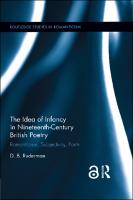The Idea of Infancy in Nineteenth-Century British Poetry
Proposal review
Romanticism, Subjectivity, Form
Abstract
This book radically refigures the conceptual and formal significance of childhood in nineteenth-century English poetry. By theorizing infancy as a poetics as well as a space of continual beginning, Ruderman shows how it allowed poets access to inchoate, uncanny, and mutable forms of subjectivity and art. While recent historicist studies have documented the "freshness of experience" childhood confers on 19th-century poetry and culture, this book draws on new formalist and psychoanalytic perspectives to rethink familiar concepts such as immortality, the sublime, and the death drive as well as forms and genres such as the pastoral, the ode, and the ballad. Ruderman establishes that infancy emerges as a unique structure of feeling simultaneously with new theories of lyric poetry at the end of the eighteenth century. He then explores the intertwining of poetic experimentation and infancy in Wordsworth, Anna Barbauld, Blake, Coleridge, Erasmus Darwin, Sara Coleridge, Shelley, Matthew Arnold, Tennyson, and Augusta Webster. Each chapter addresses andanalyzes a specific moment in a writers’ work, moments of tenderness or mourning, birth or death, physical or mental illness, when infancy is analogized, eulogized, or theorized. Moving between canonical and archival materials, and combining textual and inter-textual reading, metrical and prosodic analysis, and post-Freudian psychoanalytic theory, the book shows how poetic engagements with infancy anticipate psychoanalytic and phenomenological (i.e. modern) ways of being in the world. Ultimately, Rudermansuggests that it is not so much that we return to infancy as that infancy returns (obsessively, compulsively) in us. This book shows how by tracking changing attitudes towards the idea of infancy, one might also map the emotional, political, and aesthetic terrain of nineteenth-century culture. It will be of interest to scholars in the areas of British romanticism and Victorianism, as well as 19th-century American literature and culture, histories of childhood, and representations of the child from art historical, cultural studies, and literary perspectives. "D. B. Ruderman’s The Idea of Infancy in Nineteenth-Century British Poetry: Romanticism, Subjectivity, Form is an interesting contribution to this field, and it manages to bring a new perspective to our understanding of Romantic-era and Victorian representations of infancy and childhood. …a supremely exciting book that will be a key work for generations of readers of nineteenth-century poetry." Isobel Armstrong, Birkbeck, University of London Victorian Studies (59.4)
Keywords
Anna Barbauld; Augusta Webster; Ballad; British Literature; British Poetry; British Romanticism; Childhood; Coleridge; Erasmus Darwin; Infancy; Literature; Lyric Poetry; Matthew Arnold; Nineteenth Century Poetry; Pastoral; Poetics; Psychoanalytic Theory; Research; Romanticism; Romantic Poetry; Sara Coleridge; Shelley; Sublime; Tennyson; William Blake; WordsworthDOI
10.4324/9781315640266ISBN
9781317276494, 9780367876678, 9781138191853, 9781315640266, 9781317276494Publisher
Taylor & FrancisPublisher website
https://taylorandfrancis.com/Publication date and place
2016Imprint
RoutledgeSeries
Routledge Studies in Romanticism,Classification
Literary studies: c 1800 to c 1900
Literary studies: poetry and poets
Literature: history and criticism


 Download
Download